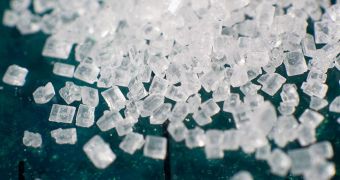Eating moderate amounts of dietary sugar can be beneficial for health, and may please people, but consuming a lot more of the stuff can have serious adverse consequences. According to a new scientific study, it would appear that ingesting some 21 spoonfuls of sugar each day can lead to a significant drop in “good” cholesterol levels. Additionally, the same investigation uncovered that the amount of triglycerides in the body jumps to high levels.
This type of glyceride represents a variation of fat that can have severe influences on the human hearts, leading to various diseases and even stroke. Researches behind the study say that, while 21 spoonfuls of sugar may seem like a large amount to eat every day, this is nevertheless just how much an average American citizen consumes within 24 hours. The team publishes its findings in the latest issue of the respected Journal of the American Medical Association.
In addition to these effects, added sugar can also influence other aspects of the human body, such as for instance the formation of tooth cavities. Previous investigations have associated it with the development of obesity and diabetes, which are in themselves triggers for heart diseases. The really bad news is that these added sugars include various kinds of sweeteners, even corn syrup, and that they are added to basically any food, ranging from canned soup and beans to cakes and so on. The new work was conducted by a team of investigators based at the Emory University, in Atlanta, the United States.
The new study also highlights the fact that it's not only foods high in cholesterol, such as eggs, that influence the amount of “good” cholesterol in the human body. Added sugars, found in products that don't really need sweetening, can take a hefty toll on public health, especially when considering that they are everywhere. Throughout the day, the amounts of ingested sugar add up, to a total of 21 spoons per day, the investigators say, quoted by LiveScience.

 14 DAY TRIAL //
14 DAY TRIAL //